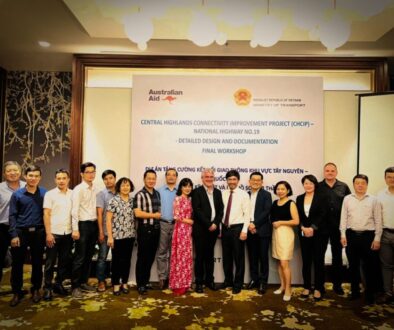Digital transformation: an inevitable requirement for growth also for the transport sector
IN BRIEF
The Ministry of Transport (MOT) of Vietnam is becoming a pioneer when it comes to innovation and comprehensive digital transformation. Aiming to meet the growing needs of the transport industry and Vietnam’s strategic goals and plans for prosperous socio-economic development, MOT has been putting significant effort into developing and implementing advanced digital systems. The extensive use of digital data across departments and stakeholders will optimise all management activities, allow well-informed and transparent decision-making, and contribute to the development of a modern and efficient transport infrastructure network.
The Australian Department of Foreign Affairs and Trade (DFAT), through Aus4Transport, has been funding three independent activities to assist MOT in its digitisation process in support of the Vietnamese e-Government agenda. Aus4Transport has been partnering with the Ministry of Transport (MOT), the Vietnam Railway Authority (VNRA) and Vietnam Inland Waterway Administration (VIWA) to develop integrated web-based platforms that allow MOT, concerned administrations and related stakeholders, to collect and manage information on transport infrastructure and investment projects more easily and efficiently, facilitating operation and management, as well as attracting more investment from domestic and international investors.
The “Transport Project Management Information System (TPMIS)”, jointly managed by Aus4Transport and the Department of Transport Construction and Quality Management (TCQM) under MOT, is approaching its final phase, of development and testing while the other two activities, “Integrated Management Information System to support Inland Waterway Transport Improvement (IW-MIS)” and “Building A Management Information System For Railway Infrastructure (VNRA-MIS)”, were approved at the end of 2021 and are in the initial stages of implementation. All three activities have made significant progress despite obstacles and challenges due to COVID-19 restrictions.
KNOW MORE…
As a result of the remarkable development of science and technology, digital transformation has become an almost mandatory requirement in all fields, playing an important role and being the main driving force for the development of any country. The impacts and further potential of the digital world have become even more evident during the past 2 years. As the Covid-19 pandemic turned the world upside down, imposing long periods of lockdown and strict restrictions in all countries, causing closures and interruption in education, services industries, transportation and logistics, and limiting access to medical services, digital transformation has become a lifeline, a matter of survival and continuity of “normal life” for people, businesses, industries, and governments around the world. The internet has become the world’s office, its market place and in some cases its health clinics. It has become the only way to continue maintaining production, business and livelihood activities.
The Government of Vietnam (GOV) is fully aware of the vital role digital transformation has to play in economic and social growth and has set clear and ambitious goals to develop digital government and the digital economy. Transport is one of the eight sectors identified as a priority for digital transformation between 2020 and 2025. In implementing the GOV e-Government strategy, the Ministry of Transport (MOT) should focus on developing technical systems to manage transport infrastructure data for the whole industry, including databases of transport infrastructure facilities, vehicle drivers, vehicles, and transport service providers.
Aus4Transport, an initiative supported by the Government of Australia (GOA) through the Department of Foreign Affairs and Trade (DFAT), is proudly supporting the Vietnam transport sector to approach those targets through three separate activities in partnership with MOT and two of its sub-sector agencies: Vietnam Railway Authority (VNRA) and Vietnam Inland Waterway Administration (VIWA). These three activities are building online, web-based management information systems to facilitate efficient management, operation and planning across the transport sector in line with GOV strategic plans and regulations.
The “Transport Project Management Information System (TPMIS)” activity is developing a platform that will provide a comprehensive database and online management system of all transport infrastructure projects, capturing relevant information required for efficient management operations, and ensuring MOT’s leaders have timely and accurate information available for better decision-making. This new digital information system will facilitate connectivity between ministries and sectors, allowing for implementation and evaluation processes of all investment projects, providing analytic functions to assist MOT’s leaders to easily monitor performance, and extract lessons learnt from previous projects, thus having a positive impact on transport infrastructure improvement in Vietnam.
TPMIS is approaching its final stage and is expected to be fully approved soon. Following the beta version development in May last year, the Development Consultant worked closely with the Department of Transport Construction and Quality Management (TCQM) from July to November to conduct the pilot trial with three PMUs – Highway Ho Chi Minh, Waterways and Maritime. This required significant effort from all related stakeholders as the trial had to be undertaken remotely due to COVID-19 restrictions. However, with the easing of the Pandemic control measures in late November, progress on the activity has sped up and TPMIS is now ready to be approved and launched. The adoption of TPMIS will be an important milestone for MOT, leading to a fundamental change in management methods.
While the TPMIS mainly targets the management level, enhancing transport project management efficiency in all sub-sectors, and attracting more investment, the “Integrated Management Information System to support Inland Waterway Transport Improvement (IW-MIS)” focuses on developing an online web-based platform that will allow Vietnam Inland Waterways Administration (VIWA) to digitise and monitor a selection of its existing activities. The IW-MIS will be divided into four categories: E-office, Infrastructure Operations and Maintenance, Vessels and Crews Management, and Ports Management. This integrated and unified Management Information System (MIS) will facilitate data-driven decisions, support strategic planning, and improve the operation, maintenance and management of VIWA‘s assets.
IW-MIS is in the very early stages of implementation and all parties are considering expanding the activity to include upgrading VIWA’s IT infrastructure, standardising data collection, and expanding the pilot project to ensure the applicability and sustainability of the newly developed IW-MIS. The expansion of the original activity is proposed to be implemented as an additional service utilising surplus funds from Aus4Transport and it is awaiting for submission to the next Program Steering Committee Meeting.
The third activity, “Building A Management Information System for Railway Infrastructure (VNRA-MIS)”, is supporting MOT’s digital transformation by assisting MOT and VNRA to develop and upgrade the railway infrastructure systems, allowing the administration to easily use data-driven technology to facilitate the operation and management of railway infrastructure throughout the country. Having been approved in the last quarter of 2021, the activity is constrained by a tight 12-month implementation period to develop the whole system. Since the beginning of its implementation, Aus4Transport has been working closely with VNRA and both parties have shown great commitment to making VNRA-MIS a reality through delivering the tasks according to the agreed workplan and responding in a timely manner.
In early February 2022, VNRA approved the Conceptual Design and procurement of software development services is underway, with development expected to start in April 2022. Both parties are currently reviewing the possibility of increasing the scope to further ensure applicability and sustainability of the newly developed VNRA-MIS.
Summing up, all three activities clearly show how digital transformation is not only about technology application, but also about operational reform where new technologies, methods, and organisational models can break through challenges and spark creativity. Digitisation is a process that serves a long-term goal and requires the awareness, commitment, and active cooperation of all users, as well as from general society. By assisting in the development of these three platforms, Aus4Transport is once again supporting Vietnam’s strategic priorities to increase investment in Vietnam’s transport infrastructure, leading the country to an improved national transport network that supports economic growth and poverty reduction.




